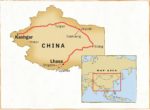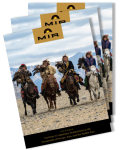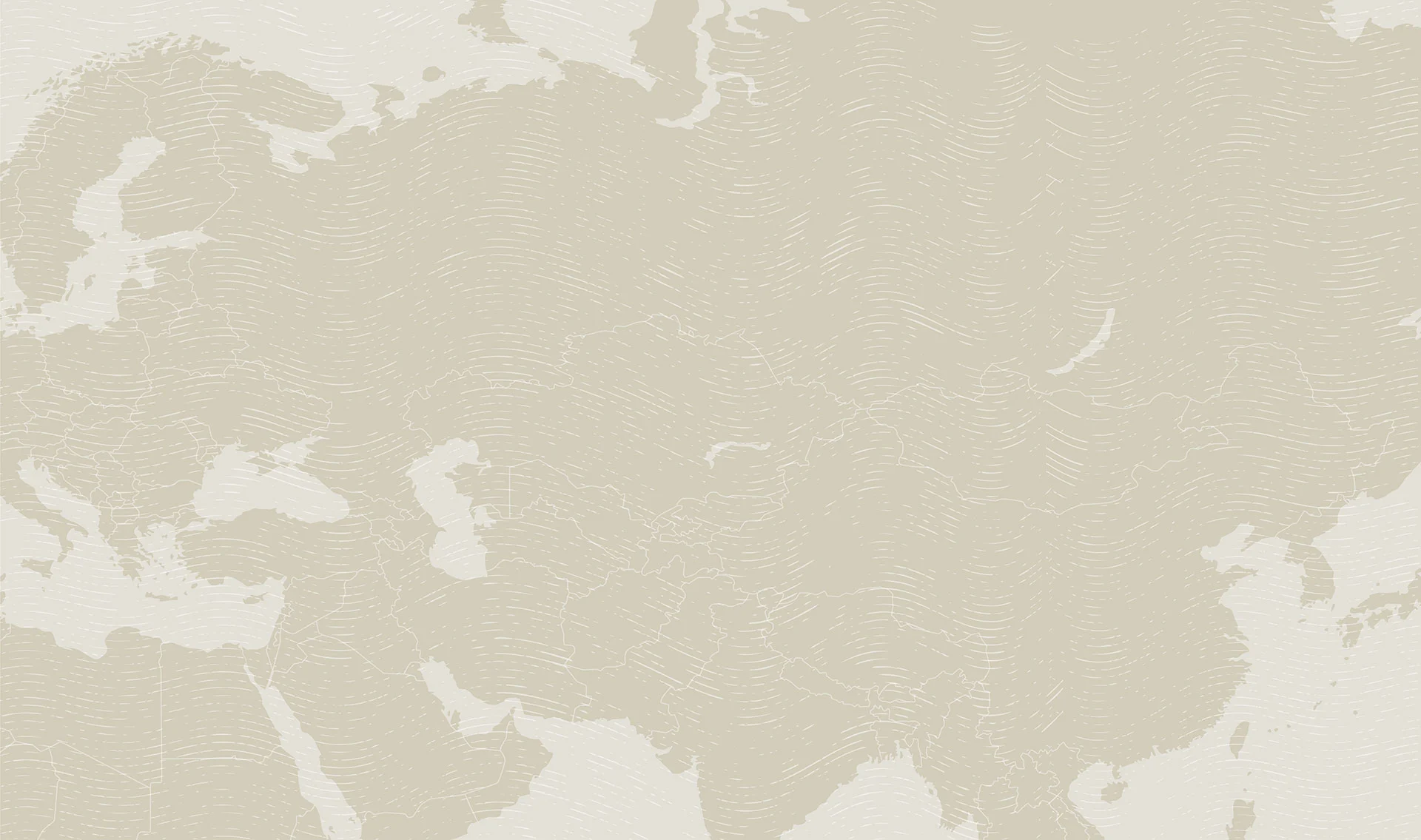China’s Silk Road & Tibet: Route of Monks & Merchants
Photo credit: Julia Rindlaub
An Expedition from Kashgar to Lhasa
Overview
Retrace the overland journey of ancient traders and adventurers on a segment of the old Silk Road. Begin in Western China, experiencing the legendary Kashgar Sunday Animal Market, where merchants sell everything from ducks to sheep. Hop a train heading east to Turpan’s lush Grape Valley – watered by a 2,000-year-old irrigation system – and to Dunhuang’s UNESCO-listed Mogao Caves, frescoed and carved with a thousand images of the Buddha. Ride the high-altitude train from Xining to Lhasa, visiting one of Tibet’s most iconic sites, the Potala Palace. Explore the Tibetan Plateau on a splendid route that embraces the sacred cities of Gyantse and Shigatse, as well as Lhasa, “City of the Sun.”

Map

Itinerary
-
Days 1-5: Kashgar (China), Turpan

Begin in 2,000-year-old Kashgar, the fabled city that greeted Marco Polo as he entered the Middle Kingdom. Browse its Sunday Animal Market, where locals purchase livestock for meat, milk, or transportation. Board an overnight train to Turpan, a welcome oasis on the northern Silk Road. The sweet wine grapes cultivated in Turpan are irrigated with a 2,000-year-old gravity-fed system. Explore the Bezeklik Thousand Buddha Caves, begun in 366 AD, and investigate the underground tombs of Astana.
HIGHLIGHTS
- Kashgar Sunday Market and its unrivaled animal bazaar
- 17th century Abakh Hoja (Fragrant Concubine) Tomb
- Turpan, the hottest city in China, located in the “Valley of Fruits”
- Bezeklik Thousand Buddha Caves, begun in 366 AD
-
Days 6-8: Train to Liuyuan, Dunhuang

Depart by fast day train to the city of Liuyuan, the gateway to Dunhuang where the Mogao Buddhist Caves were created. Marvel at the incredible frescoes and painted statues of this UNESCO-listed wonder, and take a short camel ride at the foot of Echoing Sands Mountain.
HIGHLIGHTS
- Mogao Thousand Buddha Caves, UNESCO World Heritage Site in Dunhuang
- Bactrian camel ride at the southern edge of the Taklamakan Desert
-
Days 9-11: Xining, High-altitude railway

Catch the train to Xining, located high on the Tibetan Plateau in remote Qinghai Province. Admire the brilliant blues, golds, and reds of Ta’er Monastery, and browse the grand Tibetan Medicine and Culture Museum with its impressive collection of artifacts and information about ancient Tibet. Board the high-altitude train to Lhasa, passing by the world’s highest railroad station, Tangula.
HIGHLIGHTS
- Buddhist Ta’er Monastery, with its Great Hall of the Golden Roof, constructed from hundreds of tiles with embedded precious gems
- Tibetan Medicine and Culture Museum, documenting the history of ancient Tibet from 4,000 years ago
- High-altitude railway from Xining to Lhasa
-
Days 12-18: Lhasa (Tibet), Yamdrok Lake, Gyantse, Shigatse

Spend a night in Lhasa before continuing to Gyantse’s celebrated Kumbum Stupa and turquoise Yamdrok Lake, said to be a goddess incarnate. In Shigatse, discover gold-roofed Tashilhunpo Monastery, founded by the first Dalai Lama in 1447. Back in Lhasa, visit the massive UNESCO-listed Potala Palace, rising in splendor above the city, and Jokhang Temple, Tibet’s most sacred site. Wander Barkhor Market, bargaining for yak-wool boots or Tibetan fur hats. Venture into the valley where Chupsang Nunnery is hidden, then celebrate the journey’s end with a festive farewell dinner in Lhasa.
HIGHLIGHTS
- Sacred turquoise Yamdrok Lake, a place of pilgrimage
- Gyantse, with an elevation of 4,000 meters – nearly 2.5 miles high
- 15th century Kumbum Stupa, a fabled shrine and place of Tibetan Buddhist pilgrimage
- Tashilhunpo complex, seat of the Panchen Lama in Shigatse
- UNESCO-listed Potala Palace, with thousands of altars and statues
- Jokhang Temple, Tibet’s most sacred site since the 7th century
- Barkhor Market, the old market of Lhasa
- The small Chupsang Nunnery, where some 130 nuns chant and meditate
Dates & Prices
Small group tour – max 16 travelers
Land tour price, per person. Based on double occupancy and minimum group size of 6 travelers.
-
2025 Dates
Oct 10 - 27Tour, double occupancy$7,495Partial single supplement$1,425
-
2026 Dates
Oct 9 - 26Tour, double occupancy$7,495Partial single supplement$1,450
What's Included
-
Tour Includes
- Accommodations, as noted in the itinerary.
- Tibetan travel permit fee.
- Most meals, as noted in the itinerary: 17 breakfasts, 16 lunches and 17 dinners.
- Restaurant tips for included meals.
- Services of experienced, English-speaking local guides, drivers and other staff, including a MIR Tour Manager.
- Arrival/departure airport transfers. MIR will arrange for all travelers to be met on arrival and seen off on departure whether we make your airfare arrangements or not, provided you arrive and depart on the tour start/end dates in the tour start/end cities.
- Ground transportation throughout itinerary by private coach or van (size of vehicle depends on group size).
- Train ticket, overnight sleeper train Kashgar-Turpan. (Four travelers per compartment, sharing with other group members.)
- Train ticket, overnight sleeper train Xining-Lhasa. (Four travelers per compartment, sharing with other group members.)
- Train ticket, day train Turpan-Liuyuan (for access to Dunhuang).
- Train ticket, day train Liuyuan-Xining (when departing Dunhuang).
- Guided sightseeing tours and entrance fees as outlined in itinerary.
- Special events, excursions and cultural performances per the itinerary.
- Gratuities to local guides, drivers, porters and other service personnel.
- Complete pre-departure electronic document that includes detailed packing suggestions, reading list links, country-specific information, maps, travel tips and more.
- Customized visa application and instruction kit (please note, visa fees are not included in the tour price).
- Electronic final update bulletin, with any late news, updates and important information.
-
Not Included
- International airfare or taxes/fuel surcharges.
- Meals not specified as included in the itinerary.
- Single supplement charge, if requested or required.
- Baggage handling.
- Items of a personal nature (phone calls, email, laundry, alcohol, excess baggage, etc).
- Gratuities to Tour Manager.
- Visa/passport fees, airport departure fees.
- Expenses incurred as a result of delay, modification or extension of a tour due to causes beyond MIR’s control.
- Travel and trip cancellation insurance.
Activity Level
-
Level 4: Rigorous
Level 4: Rigorous
This intentionally adventuresome small group tour features the challenges of riding public overnight trains in second-class cabins and of travel at high elevations. Additional challenges include some rustic accommodations without reliably constant electricity, and some long overland drives in rough or off-road conditions. There are also long days walking and standing while touring, and navigation of rail stations which can include steep steps/footbridges to cross tracks, or steep steps and dark tunnels to cross under to/from the train station. Plus unpaved sidewalks and streets, uneven surfaces and steps, absent handrails, significant stair-climbing, and absence of elevators. Only those very fit to travel and who are willing to accept local standards of amenities and services, and the physical challenges of the program, should consider joining. We strongly encourage you to speak with us about any questions you may have regarding the rigors of this trip or destination when considering this tour.
Two nights total are spent on overnight trains (four-berth compartments) with shared WC but no bath facilities. A luxurious experience should not be expected, and crowded trains are the standard. The train configuration will be one berth per traveler in four-berth train compartments on overnight sleeper trains between Kashgar and Turpan and Xining and Lhasa. Each traveler will share the compartment with three other travelers. Compartments may be mixed sex. Single compartments are not available. Solo travelers upgrading to two travelers per cabin accommodations may be matched with a roommate of the opposite sex. Four-berth compartments used for train overnights have two upper berths which require a climb up a narrow ladder/foothold. Since electricity is not a reliable constant throughout the itinerary, if you rely on electricity for CPAP (continuous positive airway pressure), or for any other reason, you must have your own battery or other back-up, or please reconsider participation. Air conditioning is not generally available.
The elevation in Xining is over 7,000 feet. The elevation in Tibet is over 10,000 feet. The altitudes can cause difficulty even in healthy travelers, and potential problems can include headaches, shortness of breath, and other more serious complications. Those with a history of medical problems, particularly cardiac or respiratory, must consult a doctor before considering this trip.
Travelers must be able to walk two miles a day while keeping up with fellow travelers on a variety of surfaces including dirt paths, grass, and the like. Trains have steep steps to enter and exit, and narrow hallways with multiple heavy doors once on board. Some attractions are accessible only by staircases with tall or uneven steps. Some toilets on this itinerary, including some of those aboard the trains, will be eastern/squatting style toilets. Elevators are not available at touring sites, nor at a few of the hotels.
Other challenges include overall shortcomings in the tourism infrastructure of these developing destinations, including some that can cause walking challenges such as unpaved sidewalks, uneven surfaces and steps, packed-dirt streets, broken pavement (streets or sidewalks), and a general absence of handrails or ramps. Accommodations vary from three-star hotels to the overnights on board public trains. Past travelers have also encountered challenges with plumbing, bureaucratic service, variety of locally available foods, and availability and quality of public restrooms.























